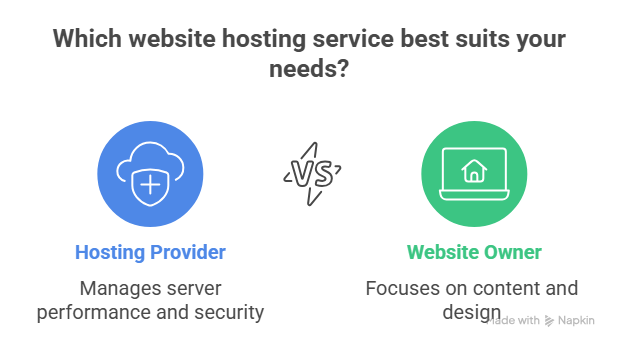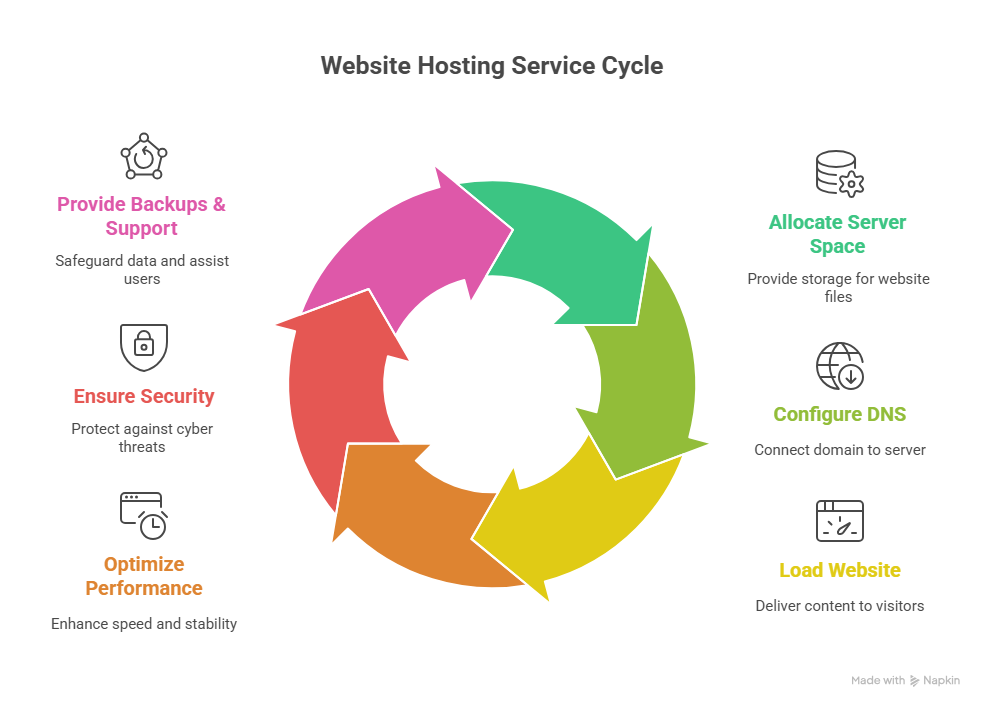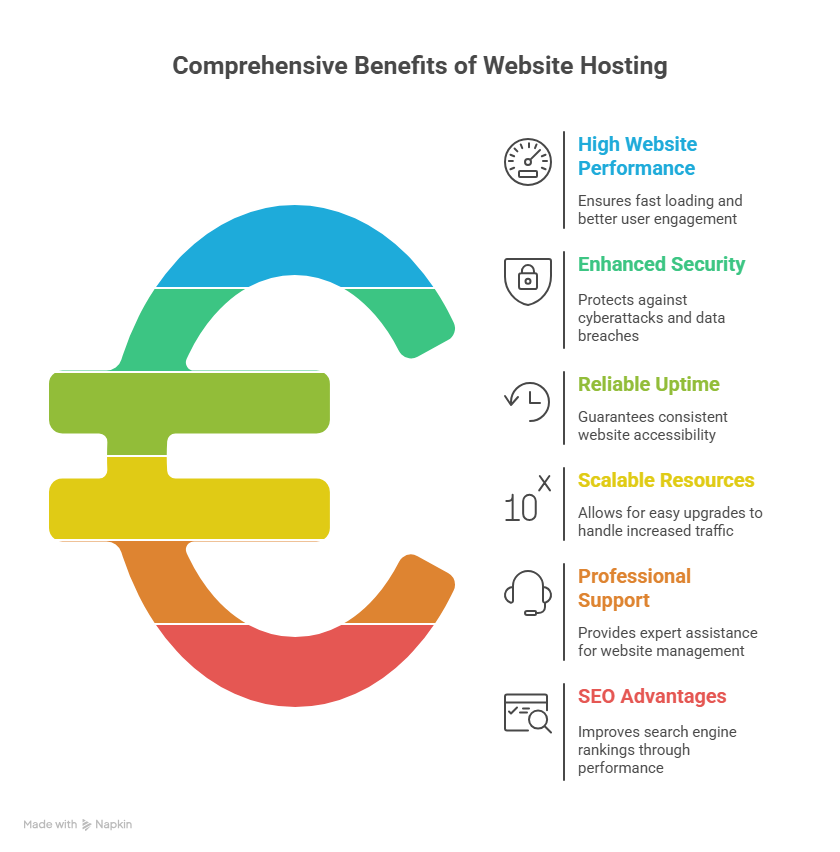
Website Hosting Service: Power Your Website with Speed, Security, and Reliability
A Website Hosting Service provides the essential server space, performance tools, and security measures that allow your website to be available online 24/7. It ensures your site loads quickly, stays secure, and has reliable uptime. Hosting services include storage, bandwidth, SSL, backups, and support—making them critical for any business, blog, or online project.
What Is a Website Hosting Service?

A Website Hosting Service is a core technology that stores your website’s files—such as code, text, images, and databases—on an online server, enabling global access. Without a hosting provider, your website cannot function or appear on the internet. Hosting companies also manage server performance, implement security measures, and provide the infrastructure that keeps websites online and efficient. In fact, according to Google, 53% of mobile users abandon a website if it takes longer than three seconds to load, highlighting how crucial reliable hosting is for performance. Whether you run an eCommerce store, personal blog, business site, or online portfolio, website hosting forms the foundation of your digital presence.
How a Website Hosting Service Works

Before diving into the steps, it’s important to understand that a hosting service works by combining storage, networking, and server management to deliver website content to visitors in real time. Each part of the process—from DNS setup to performance optimization—helps maintain a smooth browsing experience. Below is a deeper explanation of how each stage functions.
1. Server Space Allocation
Your website files are stored on a dedicated or shared server provided by the hosting company, ensuring they are available online at all times. This server space acts as a home for your website, organizing files, databases, and media systematically. By allocating the right amount of space, the hosting provider ensures your site runs smoothly without storage limitations.
2. DNS Configuration
DNS connects your domain name to your hosting server, making your website accessible through human-readable URLs. This setup ensures that when users type your domain, they are directed to the correct server instantly. Proper DNS configuration is essential for website performance and ensures seamless connectivity across the internet.
3. Website Loading
When a visitor opens your website, the server retrieves and sends your site’s content to their browser. The speed of this exchange depends on server quality, optimization, and resource availability. Reliable hosting ensures that your site loads quickly, improving user experience and engagement.
4. Performance Optimization
Hosting providers use caching, CDN integration, and optimized resource allocation to accelerate content delivery. These enhancements reduce load times, improve responsiveness, and increase site stability. Proper performance optimization is crucial for SEO and user satisfaction.
5. Security & Monitoring
Hosting services protect your website with firewalls, malware scanning, SSL certificates, and real-time monitoring. These security measures guard against cyberattacks and detect vulnerabilities before they cause harm. Continuous monitoring ensures that threats are blocked and your site remains secure at all times.
6. Backups & Support
Automated backups safeguard your website by saving copies of files and databases regularly. This makes disaster recovery faster and prevents data loss during crashes or errors. Additionally, 24/7 customer support ensures that technical issues are resolved quickly and efficiently.
Key Features of Website Hosting Services
Website hosting services come with essential features designed to support website performance, security, and scalability. These features differ between providers, but most offer a foundational set of tools that help site owners manage their online presence effectively. Understanding these features ensures you choose hosting that matches your website’s needs.
1. Web Server Management
Hosting providers manage the servers that store and deliver your website’s content, ensuring smooth operation. They handle hardware maintenance, software updates, and performance tuning to keep servers reliable. This management reduces the burden on users by eliminating the need for technical expertise.
2. Unlimited or Scalable Bandwidth
Bandwidth determines how much traffic your website can handle during peak usage. Scalable bandwidth ensures your website performs efficiently even when visitor numbers increase. With flexible bandwidth, your site avoids slowdowns and maintains optimal speed.
3. Storage Allocation
Hosting services provide storage space for your files, media, and databases. More storage allows you to upload high-quality images, videos, and scripts without limitations. Adequate storage ensures your website stays functional and organized.
4. SSL Certificates
SSL certificates encrypt data between your website and visitors, boosting trust and protecting sensitive information. SSL is essential for SEO and is required by modern browsers for secure browsing. Hosting providers often include SSL for free to enhance website safety.
5. Website Backups
Regular backups protect your website from accidental data loss or damage caused by cyberattacks. Backups store copies of critical information that can be restored when needed. Automated backup systems make recovery simple and stress-free.
6. 24/7 Technical Support
Professional hosting includes around-the-clock customer assistance to troubleshoot website issues. Support teams provide guidance on setup, migrations, bugs, and other technical concerns. Reliable support ensures your site remains functional and efficient at all times.
7. Security Protection
Strong security features include firewalls, malware scanning, and DDoS protection. These tools block unauthorized access and protect your website from online threats. Enhanced security builds user trust and keeps your website safe.
8. One-Click App Installations
One-click installers simplify adding platforms like WordPress, Joomla, or Drupal. This feature saves time by automating setup and configuration, allowing users to launch sites faster and more efficiently. In fact, WordPress powers over 43% of all websites worldwide, making one-click installation a valuable tool for beginners and professionals alike. Even beginners can create websites quickly with minimal effort.
9. Uptime Guarantee
Most hosting providers offer 99.9% uptime to ensure constant site availability. High uptime prevents lost sales, traffic, and credibility. Reliable uptime reflects a hosting provider’s commitment to performance.
Benefits of Using a Website Hosting Service

Before you explore the full advantages, it’s important to understand that professional hosting enhances performance, security, and user trust. These benefits directly influence SEO, user experience, and business growth. Here are some of the key reasons why quality hosting matters.
1. High Website Performance
Fast website loading improves user engagement and reduces bounce rates. High-performance servers ensure your content is delivered instantly to global audiences. Optimized hosting enhances overall browsing experience and boosts rankings.
2. Enhanced Security
Hosting companies provide essential protection against cyberattacks. Their security tools include malware detection, encrypted connections, and intrusion prevention systems. These features maintain your website’s integrity and protect user data.
3. Reliable Uptime
Consistent uptime ensures your website remains accessible around the clock. A reliable hosting service reduces downtime risks that affect sales and reputation. High uptime guarantees better visibility and trust.
4. Scalable Resources
As your website grows, hosting services allow you to upgrade storage, bandwidth, and server power. Scalability ensures your site adapts to increased traffic without performance drops. This flexibility supports long-term business expansion.
5. Professional Support
Expert technical teams assist with issues like migration, configuration, speed optimization, and troubleshooting. This support reduces frustration for beginners and prevents mistakes. Reliable assistance ensures smooth website operation.
6. SEO Advantages
Fast load times, secured connections, and stable uptime contribute to better search rankings. Search engines prioritize websites that perform well and provide safe browsing. Hosting plays a vital role in your SEO success.
Types of Website Hosting Services
Modern hosting solutions offer different packages tailored for beginners, professionals, and large businesses. Each hosting type varies in power, flexibility, and cost, so it’s important to choose one based on your technical needs and expected traffic. Below are the most common hosting types.
Shared hosting allows multiple websites to share resources on one server. It is cost-effective and ideal for beginners with smaller websites. While performance may vary, it provides an easy starting point.
2. VPS Hosting
A Virtual Private Server isolates your website’s environment for better control and performance. VPS hosting offers dedicated resources without the cost of a full server. This type is perfect for growing websites and businesses.
3. Dedicated Hosting
Dedicated hosting provides a full physical server exclusively for your website. This guarantees maximum performance, security, and customization. It is ideal for high-traffic sites and enterprise-level businesses.
4. Cloud Hosting
Cloud hosting distributes website resources across multiple servers. This ensures excellent uptime, scalability, and reliability during traffic spikes, which is why around 96% of companies now use at least one public cloud service. It is suitable for modern, fast-growing online businesses.
5. Managed WordPress Hosting
This hosting is tailored specifically for WordPress websites. Providers handle updates, security, and optimization automatically. It simplifies management for bloggers and business owners.
6. Reseller Hosting
Reseller hosting allows you to sell hosting services to clients under your brand. It includes administrative tools for managing multiple accounts. This is ideal for agencies and developers.
Website Hosting Service vs DIY Hosting
| Feature | Professional Hosting Service | DIY Hosting |
|---|---|---|
| Performance | Fast & optimized | Slow & unstable |
| Security | Strong protections | High risk of attacks |
| Support | Expert help | No technical support |
| Cost | Affordable | Expensive hardware |
| Ease of Use | Easy setup | Technical expertise needed |
| Scalability | Very easy | Limited capacity |
How to Use a Website Hosting Service

Understanding how to use hosting effectively helps you build, manage, and launch a professional website. Each step ensures proper setup, security, and performance optimization. Follow the process below for seamless website deployment.
Step 1: Choose a Hosting Provider
Select a reputable hosting company based on performance, support, and pricing. Popular choices include Bluehost, SiteGround, HostGator, GoDaddy, and Cloudways. Compare features to find the best fit for your needs.
Step 2: Select the Right Hosting Plan
Decide whether you need shared, VPS, cloud, or dedicated hosting based on your website size and traffic. Choosing the right plan ensures your website performs efficiently. You can upgrade anytime as your business grows.
Step 3: Register or Connect Your Domain
Purchase a new domain or connect an existing one to your hosting account. Proper domain configuration ensures users can reach your website easily. This setup is essential for making your site publicly accessible.
Step 4: Install Your Website Platform
Use one-click installers to set up platforms like WordPress, Joomla, or Drupal. This simplifies the creation process and saves time for beginners. The installation typically takes just a few minutes.
Step 5: Upload Website Files
Add your website scripts, images, and content through cPanel, file manager, or FTP. Make sure all files are organized and placed in the correct directories. Once uploaded, your website becomes visible online.
Step 6: Secure Your Site
Enable SSL, configure firewalls, and set up malware protection. Security measures prevent attacks and protect user data. Hosting providers often include these features at no additional cost.
Step 7: Monitor and Optimize
Use speed tools, analytics, and server insights to evaluate performance. Regular monitoring ensures your website remains fast, secure, and stable. Optimization helps maintain search rankings and user satisfaction.
Limitations of Website Hosting Services
Not all hosting plans are equal, and some limitations may affect website performance depending on your provider. These limitations typically appear in low-cost plans. Understanding these helps you choose the right hosting option.
Shared hosting can slow down during peak traffic times because multiple sites share the same server. This affects performance and load speed. It’s best suited for small websites.
2. Pricing Increases
Promotional prices are often lower than renewal rates. Renewal fees may surprise new customers if they are not reviewed beforehand. This is common across most hosting services.
3. Technical Limitations
Budget hosting packages might restrict access to advanced settings or features. Developers may find these limitations restrictive for complex sites. Upgrading plans usually solves this issue.
TaskVirtual: Your Partner in Website Management & Hosting Assistance
Managing a website involves ongoing tasks like performance monitoring, plugin updates, server checks, content management, and security reviews—which can be overwhelming for business owners and creators. From optimizing hosting environments to troubleshooting speed issues, technical duties often take time away from growth-focused work. TaskVirtual helps streamline your website management by offering website hosting services that handle hosting-related tasks, website upkeep, and operational workflows with ease.
1. Expert Hosting & Website Review Assistance
TaskVirtual’s trained virtual assistants help you analyze hosting performance, evaluate server needs, and organize essential website management tasks. They offer guidance on choosing hosting platforms, optimizing resource usage, and ensuring your website stays efficient. Their expertise helps reduce downtime and keeps your site performing at its best.
2. Affordable and Flexible Pricing
Hiring full-time technical staff can be costly, especially for small businesses and startups. TaskVirtual provides an economical solution with pricing plans starting from just $3.12/hour to $14.99/hour, making professional website assistance accessible to everyone. Their flexible plans ensure you only pay for the exact support you need.
3. Comprehensive Website Management Solutions
From managing backups and monitoring uptime to organizing content and coordinating updates, TaskVirtual offers end-to-end website support. Their scalable services adapt to your requirements, whether you need occasional help or consistent technical management. This ensures your website continues running smoothly without interruptions.
4. Ongoing Support and Quality Assurance
TaskVirtual provides proactive communication, regular updates, and reminders for important maintenance tasks. Their virtual assistants ensure hosting renewals, security patches, and performance checks are always handled on time. This ongoing quality assurance keeps your website safe, optimized, and professional.
5. Proven Track Record of Excellence
With 364 positive reviews and a 4.7-star rating on trusted virtual assistance platforms, TaskVirtual stands out as a reliable partner for website owners worldwide. Clients rely on their expertise to simplify hosting management, reduce workload, and improve overall online performance. Their reputation showcases their commitment to delivering dependable, high-quality support.
Final Thoughts on Website Hosting Services
A reliable Website Hosting Service is essential for establishing and growing your online presence. From speed and security to scalability and support, hosting directly affects your website’s performance and success. Whether you’re a beginner or an experienced developer, choosing the right hosting provider will empower your website with the tools, stability, and features necessary for long-term growth.
FAQ: Website Hosting Service
1. What is a Website Hosting Service?
It’s a service that stores your website’s files on a server so visitors can access it online.
2. Is hosting necessary for a website?
Yes. Without hosting, your website cannot go live.
3. Which hosting is best for beginners?
Shared or managed WordPress hosting works best.
4. Does hosting affect SEO?
Absolutely. Speed, uptime, and security impact rankings.
5. Can I switch hosting providers later?
Yes. Many hosting providers offer free or assisted migrations.








